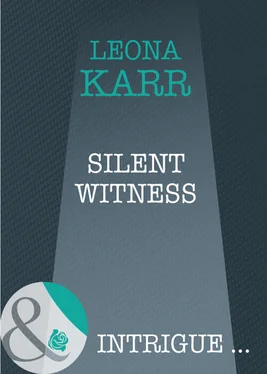Boldly he moved forward to see what he might find that was worth lifting. If he was lucky, he might even find a full pack of cigarettes and a lighter.
He had just taken a few steps into the room and was looking around, when he froze with sudden terror. Lying on the floor in front of the fireplace was the crumpled body of a man. His chest was bloody and his dead eyes stared straight at Scotty.
In that paralyzing moment, a shadow flickered across the front window, warning Scotty that someone was outside near the front door.
Frantically, he bolted back to the kitchen and pushed himself out the broken window. As he scrambled to his feet, he felt vibrations on the deck boards, warning him that someone was coming around the house.
He ran as fast as he could for the nearby cover of trees, not knowing if someone right behind him might be yelling, “Stop or I’ll shoot!”
As Marian Richards entered a large reception room in the Wentworth mansion, a hum of childish voices greeted her. The spacious, high-ceilinged room had been turned into an activity center, and as director of a summer program for disadvantaged hearing-impaired children, Marian was learning the hard way that the mountain estate with its imposing three-storied mansion had never been meant for a dozen eight-to twelve-year-old youngsters.
The property belonged to Alva Wentworth, a widow in her late seventies who was in a local nursing home. Located near one of the state’s popular tourist areas in southern Colorado the estate was worth a fortune and ripe for development. Countless investors had tried to persuade the wealthy widow to sell the estate but she had stubbornly held on to it. Her only heir had been a grandson, Stanley, whom she’d disinherited when she’d discovered a series of illegal maneuvers of his to get his hands on her money before she died. Everyone was amazed when she agreed to let the Colorado Foundation for Disadvantaged Children use the mansion and grounds for a children’s summer program.
Marian was determined that everything would go smoothly under her leadership. She’d been assistant director at a private school for the hearing impaired when she heard about the summer program and quickly applied for the position. She was delighted and slightly surprised when she was offered the job even though she was the youngest applicant, only thirty years old and still working on a doctorate in social services. She was determined that all would go smoothly, because this experience would be a professional stepping stone to the position of director at one of Colorado’s larger institutions.
Her first challenge had been to evaluate recommended children for the program. After considerable debate with teachers and social workers, she had chosen six boys and six girls of various ages and problems. She’d met with some negative reaction when she’d chosen Scotty Tanner, an eleven-year-old who had both hearing and emotional problems. Even his foster parents had warned her that the boy didn’t do well in groups.
As Marian entered the activity room, she looked around for Scotty but didn’t see the slender boy with unruly blond hair and snapping blue eyes. He usually dominated the Ping-Pong table, furiously venting his anger upon the small ball. Already Marian had learned that Scotty was constantly warring against the acceptance of his deafness and striking out at anything and everybody. He seemed intent upon isolating himself beyond what a hearing loss would create.
Uneasiness began to stir as she walked over to Rob Harman, a middle-aged physical-education teacher who had raised a deaf son and spent his summers working with the handicapped. He was easygoing and patient but at the same time firm enough to maintain control.
Marian had a staff of five people, counting herself, and was pleased they’d developed a summer curriculum that was both instructive and recreational.
“I don’t see Scotty in the room, Rob. Do you know where he is?”
“He was here right after lunch but complained his stomach hurt. He asked to go back upstairs to his bunk but I sent him to the nurse. I decided Bertha could tell whether he was goldbricking or not.” Rob sighed. “He’s not the most sociable kid on the block.”
Marian nodded in agreement. “A real loner, for sure.”
The only time the boy seemed visible was when there was trouble of some kind, but she was willing to give Scotty some leeway. He’d been running the streets most of his life. No father in the picture and a mother strung out on drugs most of the time. Scotty might have ended up serving time in a juvenile facility if a homemade bomb hadn’t plunged him into deafness and made him a ward of the court.
“Maybe after a few weeks in the program we’ll see a change for the better,” Marian told Rob. She was encouraged because she’d seen one good sign already in his behavior. For some inexplicable reason, the tough, streetwise Scotty had appointed himself protector of Mindy Simpson, a small, shy eight-year-old girl who had been deaf since birth.
Scotty had met her in class for the hearing impaired which he’d been required to attend when he was turned over to the court. It was because of the dark-haired, curly-headed Mindy that Scotty had mastered any sign language at all. Unfortunately, he seemed only willing to try signing in order to communicate with the shy little girl. Most of the time he got along as best he could with lip-reading, defying all orders to practice communicating with any of the other students.
“I’ll check with the nurse,” Marian told Rob and then walked across the room to a table where several girls were involved in an activity of following directions. They were making Indian god’s eyes out of yarn and sticks. Because a field trip was planned to the nearby Mesa Verde Indian ruins, the teachers had decided to incorporate some of the activities, stories and art around an Indian theme.
Nancy Collins, a chubby, round-faced teacher in her early forties, was busily moving around the table, smiling, nodding and signing her approval. Marian had worked with Nancy before and was delighted when the outgoing, good-natured teacher had applied for the summer program. Together they had developed a program of activities to help hearing-impaired children develop language, speech and listening skills.
Marian stopped at Mindy’s chair and lightly touched the little girl on the shoulder to get her attention. As she looked up, her smiling eyes were a sparkling blue and full of life.
“I’m looking for Scotty,” Marian signed. “Do you know where he is?”
She shook her head and her fingers flitted like butterflies as she responded, “I haven’t seen him since lunch. Is he in trouble again?”
I hope not. Marian sighed silently as she nodded approval of the rather lopsided god’s eye that Mindy held up for her approval.
Even though a building uneasiness urged Marian to find Scotty as soon as possible, she took time to look at all the girls’ handiwork. Marian knew these children wanted so much to connect with other people that sometimes they were like puppies willing to do anything for a pat on the head.
“We’re going to make one to hang in your office,” Nancy told her with a grin. “It’ll keep all the problems away from your door.”
“What a lovely idea. The sooner the better.”
“What’s happening?”
“I feel as if I’m holding on to a dozen horses going in all directions,” Marian admitted. “New-job jitters, I guess.”
“Relax, everything’s under control,” Nancy assured her with her usual optimistic grin.
Marian gave her a grateful smile as she left the room and headed down the hall to a small sitting room that had been changed into a nursing station and dispensary.
Читать дальше












